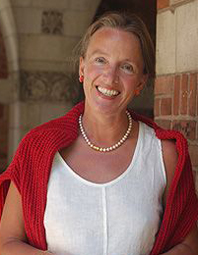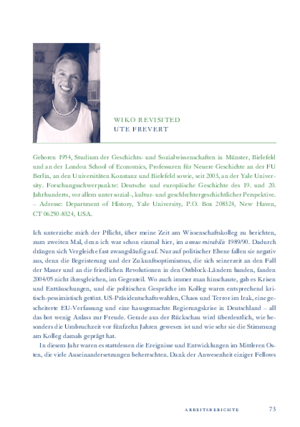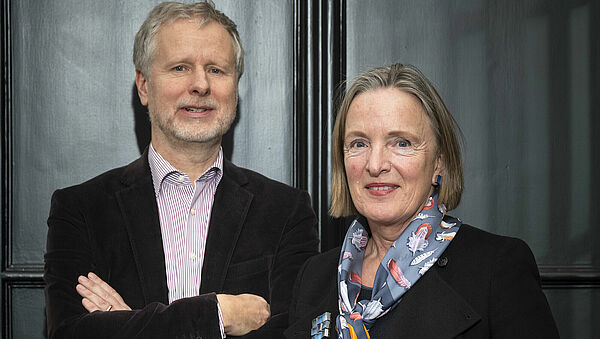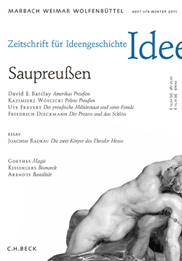
Ute Frevert, Dr. phil.
Professor of History
Yale University
Geboren 1954 in Schötmar b. Bad Salzuflen, Deutschland
Studium der Geschichte und Sozialwissenschaften an den Universitäten Münster und Bielefeld und an der London School of Economics
Project
History of Trust
In diesem Arbeitsprojekt geht es darum, Vertrauen als "Schmiermittel" persönlicher, sozialer, politischer und ökonomischer Beziehungen zu historisieren. Im Mittelpunkt steht die westliche Moderne des 19. und 20. Jahrhunderts. Angestrebt ist, durch Hinzuziehung ethnographischer und historiographischer Literatur kontrastierende Blicke auf außereuropäische Vertrauens- und Misstrauensstrukturen zu werfen.Transnational Friendships
Dieses Arbeitsprojekt siedelt sich in der Zwischenkriegszeit an, in jener gleichermaßen hoffnungsvollen wie verzweiflungsreichen Phase europäischer Geschichte, in der ethnische Nationalismen ihren Höhepunkt erreichten. Biographische Portraits transnationaler Freund- und Partnerschaften sollen einen Kontrapunkt setzen und die Chancen, Bedingungen und Grenzen solcherBegegnungen und Beziehungen aufzeigen.
Lektüreempfehlung
Frevert, Ute. Ehrenmänner: Das Duell in der bürgerlichen Gesellschaft. München: Beck, 1991 (auch in engl. Übersetzung).
-. Die kasernierte Nation: Militärdienst und Zivilgesellschaft in Deutschland. München: Beck, 2001 (auch in engl. Übersetzung).
-. Eurovisionen: Ansichten guter Europäer im 19. und 20. Jahrhundert. Frankfurt/Main: Fischer, 2003.
Colloquium, 23.02.2005
Was heißt und zu welchem Ende studiert man...europäische Geschichte?
In 1789, Friedrich Schiller gave his inaugural lecture in Jena, addressing the topic "What is and for purpose does one study world history?" Instead of discussing the world, though, he confined himself to Europe, which he considered the interesting center of the world.
I would like to pick up this thread and discuss modern Europe by linking it to the development of nation-states. Nation-states have been the most powerful players over the last two centuries, and up to 1945, competition among them brought Europe (and the rest of the world) an eruption of violence of egregious proportions. At the same time, intense cooperative relations emerged on different levels, in different areas of society, and among different groups.
I will provide examples of these collaborations and communicative links. Some of my examples are well known, others quite surprising. In my opinion, they are the material upon which European history must be based-a history of appropriations and demarcations, of different speeds and variously dense patterns of contact.
Such a history involves much more than adding together national histories, a practice that continues to enjoy great popularity in standard works of history. Nor is it identical with the tableau of cross-European structures and processes whose effects are measured by means of comparisons. And it has nothing to do with the breathless search for the conceptual-historical roots of European integration-a search we see many embarking on today.
What I am describing is a history of European experience. This kind of history is interested in the exchange processes that have taken place between specifiable players at specifiable times under specifiable conditions. It questions not only the conditions but also the limits of communication. In this sense, it can be seen as a critical contribution to the debate on European identity.
Publications from the Fellow Library
Frevert, Ute (Göttingen, 2024)
Verfassungsgefühle : die Deutschen und ihre Staatsgrundgesetze
Frevert, Ute (London, 2024)
Writing the history of emotions : concepts and practices, economies and politics Writing history
Frevert, Ute (Cambridge, 2023)
The power of emotions : a history of Germany from 1900 to the present Mächtige Gefühle
Frevert, Ute (Göttingen, 2021)
Gefühle in der Geschichte Kritische Studien zur Geschichtswissenschaft ; Band 245
Frevert, Ute (Bielefeld, 2020)
Jenseits von Corona : unsere Welt nach der Pandemie - Perspektiven aus der Wissenschaft X-Texte zu Kultur und Gesellschaft
Frevert, Ute (Frankfurt am Main, 2020)
Mächtige Gefühle : von A wie Angst bis Z wie Zuneigung : deutsche Geschichte seit 1900
Frevert, Ute (Oxford, 2020)
The politics of humiliation : a modern history Die Politik der Demütigung
Frevert, Ute (Göttingen, 2019)
Moral economies Geschichte und Gesellschaft
Frevert, Ute (Frankfurt am Main, 2017)
Die Politik der Demütigung : Schauplätze von Macht und Ohnmacht S. FischerGeschichte
Frevert, Ute (London, 2014)
The moral economy of trust : modern trajectories The ... annual lecture ; 2013


